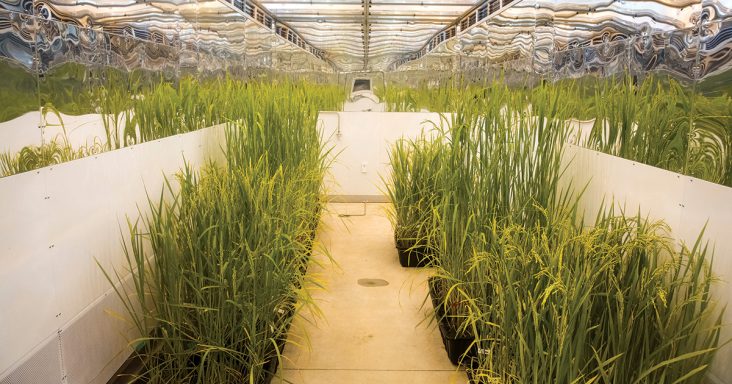New rice genetics research focus of $10 million USDA grant
by April 9, 2023 9:44 pm 815 views

A new rice breeding greenhouse. (Division of Agriculture photo by Fred Miller)
No one knows precisely when rice arrived in the Americas, but historians think African slaves brought the grain with them to the new world. Slaves grew rice in small gardens to feed themselves.
In 1685, a new variety of rice, Carolina Gold, started to be grown as a cash crop in South Carolina. The new variety made the crop profitable, and it was the leading export out of the Palmetto State by 1720, according to science.org.
Genetic scientists have been able to trace the origins and varieties of rice as it evolved through the centuries. A new group of scientists is now trying to develop new varieties of rice and growing techniques that can withstand the impacts of global climate change and specifically ones that use less water.
Arkansas Agricultural Experiment Station scientists Nick Bateman, associate professor and extension entomologist, and Stan De Guzman, assistant professor and rice breeder, have been awarded $547,842 as part of a four-year, $10 million grant from the U.S. Department of Agriculture’s National Institute of Food and Agriculture. Louisiana State University is the lead institution on the grant to improve the sustainability and profitability of rice farming through research innovations. Jai Rohila, a research agronomist for USDA’s Agricultural Research Service based at the Dale Bumpers National Rice Research Center in Stuttgart, is also involved in the grant.
“I am thrilled to see this investment in rice research by USDA-NIFA,” said Jean-François Meullenet, director of the Arkansas Agricultural Experiment Station and senior associate vice president for agriculture-research for the Division of Agriculture. “I want to congratulate LSU and the research team on this award. This project has the potential to enhance rice production in southern states, and I look forward to the impact it will have on rice farmers in Arkansas.”
Extreme weather patterns due to climate change pose serious challenges to enhancing productivity, according to the project proposal summary. The project aims to help rice growers in the southern U.S. make the right decisions at the right time to reduce yield losses, land use, and water and energy consumption.
Rice is among Arkansas’ top three agricultural commodities, and was worth approximately $1.2 billion in 2020. The state typically produces up to 58% of the nation’s long-grain rice, and about half of the nation’s total crop each growing season, according to the USDA. Farmer William Fuller planted the first rice grown in Arkansas in 1904, according to the Arkansas Farm Bureau. Planted acres in the state topped 1.1 million last year.
De Guzman will work to develop rice lines with heat stress tolerance using advanced genetic techniques. The process includes evaluating different rice lines for grain quality and agronomic and physiological traits under drought stress in field conditions using the alternate wetting and drying growing method. He will then work to incorporate those genetic traits into elite rice lines and varieties with drought and heat tolerance.
Bateman’s role is to conduct a study that monitors the changes in insect pressure when moving from flooded rice to the alternate wetting and drying method for water savings. Bateman said rice water weevil larvae are substantially reduced when moving to alternate wetting and drying. Still, other insects like armyworms, rice billbugs and chinch bugs are prone to pop up. He will look at environmentally friendly pesticides to control those populations.
“It’s not so much about controlling the insects but controlling the stress,” Bateman said. “Since part of the overall project is to reduce water use, we will be looking at what other insect pressures arise when you take it off a flood.”
Prasanta Subudhi, the lead investigator of the project and a crop geneticist in the LSU AgCenter School of Plant, Environmental and Soil Sciences, said farmer support is the goal.
“We will equip the current and next generation of rice farmers, consultants and researchers with the necessary knowledge and skill set to embrace the new climate-smart agriculture technologies and production practices,” he said.
“Knowledge gained from this project will increase the speed and accuracy of identifying rice genotypes with desirable combinations of genes for improved adaptation to a changing climate,” the project proposal summary states.
The specific objectives of the project are to assess the socio-economic and environmental impacts of current crop management practices and identify barriers to adopting novel technologies and practices; develop novel genotypes with enhanced tolerance to biotic and abiotic stresses; develop and optimize environmentally friendly crop management practices; and implement a robust extension program to disseminate the concepts and benefits of sustainable farming technology.
The five collaborating institutions are members of the Southern Association of Agricultural Experiment Station Directors, which represents 15 agricultural research centers at land-grant universities in the southern U.S. Southern region scientists collaborate to conduct research and outreach focused on conserving the region’s natural resources and sustainably feeding a growing global population.
“This grant demonstrates the importance and power of regional research collaborations in providing solutions to pressing problems that impact growers and consumers,” said Gary Thompson, executive director of the Southern Association of Agricultural Experiment Station Directors. “This significant federal investment leverages the capacity of our State Agricultural Experiment Stations to assist farmers in modifying their practices to a changing environment.”
The grant is part of a $70 million project from USDA to establish robust, resilient and climate-smart food and agricultural systems.
“Southern U.S. rice production is concentrated in Louisiana, Arkansas, Mississippi and Texas, and rice research is a major component of the research portfolios of the agricultural experiment station in these states,” said Michael Salassi, interim LSU AgCenter executive associate vice president and director of the Louisiana Agricultural Experiment Station. “This grant will provide the many rice scientists across the region the opportunity to work collaboratively to evaluate alternate climate-smart production practices associated with a major U.S. food crop.”
